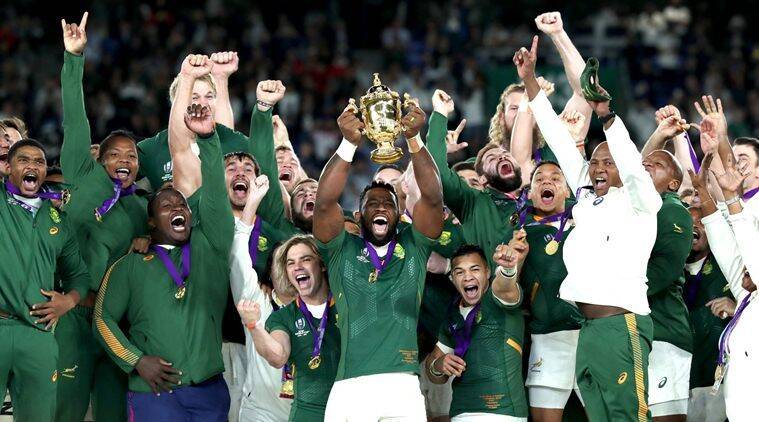1. The Ubuntu of Sports
Ubuntu- Botho, every individual is a member of their community. No matter what rules and regulations say, athletes are also part of this society. As such, all matters happening in the community affects them as much as anyone. We should not therefore be surprised some games have helped heal and divided societies, some have helped initiate diplomacy processes.
South Africa at the Rugby World Cup
South Africa’s apartheid system excluded non-White players from playing with their White counterparts in the national team. As a result, the country was banned from the 1987 and 1991 world cup tournaments.
After apartheid ended in 1994, every South African was allowed to play. In 1995, a team containing both Black and White players participated in the world cup.
South Africa were crowned champions at a match attended by former President Nelson Mandela. This became a turning point in South African race relations, as Mandela was seen freely associating with White rugby players. As both Black and White South Africans celebrated the win, they found themselves united in victory despite their differences. This is the real epitome of Ubuntu in South Africa, the art of respecting each other regardless of our differences.
The Ivory Coast Civil War
In 2002, a group rebelled against the Ivory Coast government. A deal between these rebels and the government was reached the following year. Unfortunately, the peace was short lived, and fighting broke out in 2004. Months of war that involved the government, rebels, France, and Liberian and Sierra Leone militia ensued.
As election time approached, many feared the violence would only get worse. After beating Cameroon to make it to the 2006 World Cup, Chelsea striker Didier Drogba and his team mates made an appeal to all groups to lay down their weapons and hold elections.
“The one country in Africa with so many riches must not descend into war. Please lay down your weapons and hold elections,”
These words, coupled with the team’s stunning performance were partly responsible for the warring factions to start work towards peace. Even though Ivory Coast would be embroiled in another civil war five years later, Drogba and his team mates proved athletes hold the power to change society.
Ping-Pong diplomacy
The second half of the twentieth century was characterised by a period known as the cold war. This was a global conflict between capitalist countries led by the US, and communist nations led by the Soviet Union and China. Because of China’s role in the Korean war, relations between the US and the Asian nation remained tense.
During the 1971 table tennis world championships in Japan, American Glenn Cowan missed his team’s bus after practice. The only remaining option for him was to board the Chinese team bus, where he befriended Chinese Zhuang Zedong. As they dismounted the bus together, journalists captured the moment in photos that went viral.
This led to the US team being invited to play in China that same year. A few months later, Richard Nixon became the first American president to visit China in his official capacity.
Ubuntu in Cricket diplomacy
India gained independence from the United Kingdom in 1947. Because of religious differences, a portion of India was given independence as a separate nation. This country became known as Pakistan.
Over the past seventy plus years, relations between the two countries have been tense. They have both exchanged enemy fire, and created weapons of mass destruction in order to intimidate each other.
Though never lasting, various attempts at peace have been made. Many of these attempts have involved cricket, a sport popular in both countries.
Cricket diplomacy between India and Pakistan remains a beacon of hope for the two rival nations. As recent as 2015, the prime ministers of both countries held a conversation just before their countries clashed on the field.
Wimbledon Women
Women being discriminated against in the world of sports is not news. In many instances, female athletes continue to be paid less than their male counterparts, regardless of performance.
Once upon a time, Wimbledon, one of the biggest tennis tournaments in the world was no different. Male players pocketed about P550 000 more than the women. In 2005, Venus Williams, arguably one of the best tennis players alive protested the pay gap at Wimbledon, and was largely ignored.
The following year, Williams wrote an opinion piece in which she said, “I believe that athletes – especially female athletes in the world’s leading sport for women – should serve as role models. The message I like to convey to women and girls across the globe is that there is no glass ceiling. My fear is that Wimbledon is loudly and clearly sending the opposite message.”
This led to prominent people, including the British parliament led by Prime Minister Tony Blare adding their voices to Williams’s. Facing unprecedented public pressure, Wimbledon caved. In 2007, they announced both male and female players would be paid the same amount. The French Open followed soon after.
one will relate this tag, UBUNTU from a Mamelodi Sundowns, a South African football club, replica as their main sponsor, though it appears as UBUNTU-BOTHO.
The world has been changed by different people, from lawyers like Nelson Mandela, to school girls like Malala Yousafzai,. It should therefore come as no surprise athletes continue to carve their own marks on society.

